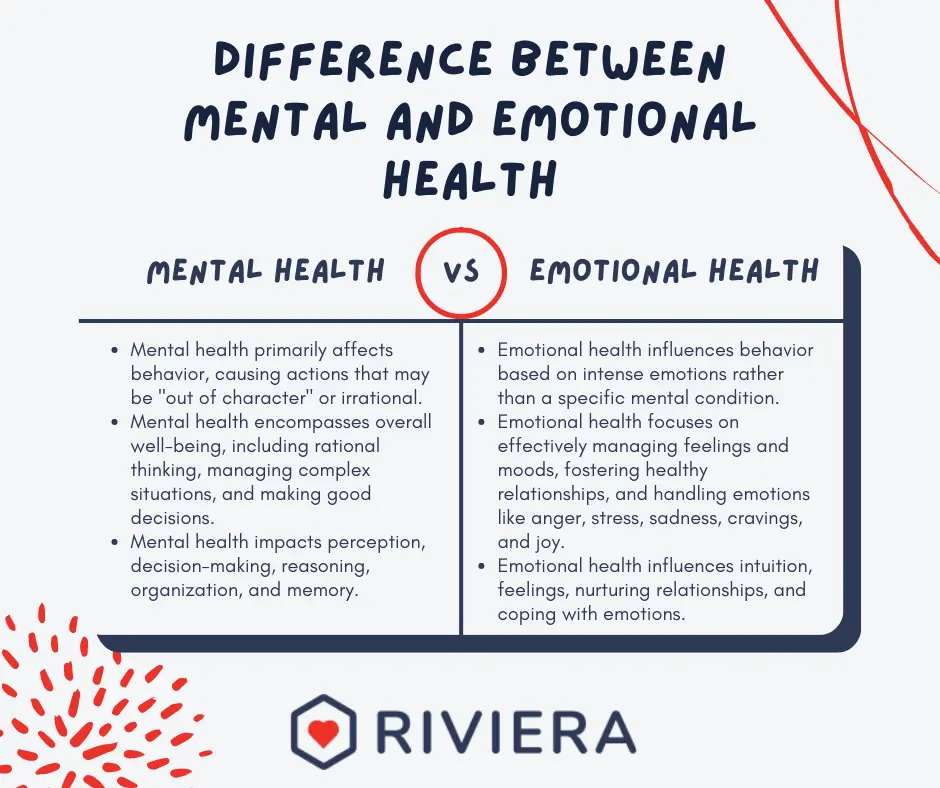It’s common to use the terms mental and emotional health interchangeably. However, both could mean two very different things. Here, we understand:
- What mental and emotional health is,
- The psychological, cognitive, and behavioral differences between the two
- How both mental and emotional health impact your overall psychological health
- The steps you can take to maintain your psychological health and well-being
The difference between mental and emotional health is that mental health focuses on thoughts and actions and emotional health focuses on feelings.
What is Mental Health?
You can see mental health as the machinery that manages your thoughts and actions. Mental branches into three main types of health: psychological, social, and emotional.
From the way you maintain your relationships with those around you to how you cope with stress, mental health influences many facets of your life.
So, what happens when you’re not at your best mental health? Here are some common issues it triggers:
- Severe mood swings
- Insomnia or oversleeping
- Chronic fatigue
- Under-eating or overeating
- Excessive use of alcohol or drugs
A variety of steps can be taken to improve the quality of your mental health. Some of these include therapy, lifestyle changes, exercise, medication, anxiety treatment, and dual diagnosis treatment.
Readers may also benefit from: A Guide To Mental Health Housing Programs In California

What is Emotional Health?
Imagine being fully aware of your emotions. Now, imagine managing and expressing these emotions in the right (age-appropriate) way. This is what having great emotional health looks like.
If your emotional health is on track at all times, you can express what you feel in healthy ways, stress doesn’t cripple your decisions, and you easily take responsibility for your own feelings.
As with everything, there is no quick fix for boosting your emotional health. You can, however, take conscious steps to improve it. For instance, you can shift the spotlight to your strengths instead of your weakness each time a difficulty knocks at your door. Treatments for severe emotional health issues include anxiety treatment, dual diagnosis treatment, depression treatment, PTSD treatment, eating disorder treatment, and more.

The Differences
Knowing what differentiates mental health from emotional health helps you “detect” any alarming symptoms and encourages you to seek help. Three of the main differences include behavioral, psychological, and cognitive.
Behavioral
What is the most prominent element that rides alongside your emotional and mental health? The answer in one word: your behavior.
A lack of good mental health may cause someone to act in a way that is “out of character” or “not very rational,” like taking harmful or risky steps.
A lack of good emotional health could lead to behavior that stems from “feeling” instead of an apparent mental condition. For instance, when someone breaks down not because they’re experiencing depression but because they’re just emotionally overwhelmed.
Psychological
Your mental and emotional health differ from a psychological vantage point. Your mental health is linked to your overall well-being. The equation here generally includes:
Rational Thinking + Managing Complicated Situations + Good Decision-Making = Good Mental Health
On the other hand, your emotional health directly points to how effectively you manage your feelings and moods. It is mainly about having the ability to carve healthy relationships (with others and yourself) by managing emotions like anger, stress, sadness, severe food cravings, and joy optimally.
Those who enjoy good overall psychological health know how to put in the work to balance their mental and emotional health.
Cognitive
What is the cognitive difference between mental and emotional health?
Simply put, it is directly linked to the way you perceive and react to a given situation. For instance, mental health can equip you to favor logic during decision-making. Emotional health, on the other hand, could be about basing your decisions on intuition or feeling.
Mental health also influences the way you reason, organize, and experience your memories. Whereas emotional health influences the way you nourish your relationships and how you cope with your feelings.

What Links Mental Health with Emotional Health?
Mental and emotional health are inextricably linked. To achieve optimal emotional stability, it’s important to address the two together. From anxiety and depression treatment to PTSD treatment – those coping with mental health issues often require professional interventions specifically tailored to meet individual needs.
Since emotional health is directly associated with overall psychological well-being, managing it demands the need for an emotionally safe environment where individuals feel accepted, nurtured, and comfortable.
Issues with emotional health pave the path for low self-esteem, anxiety, depression, eating disorders, and stress. Here, it is critical to detect emotional triggers and the way they impact your emotional state.
Chronic mental health problems give birth to mild cognitive impairments like crippled concentration levels and memory. Some of the more serious issues include PTSD, depression, substance abuse, bipolar disorder, or schizophrenia.
Read more about mental health: 10 Healthy Ways To Deal With A Bad Mental Health Day

Contact Riviera Recovery
Regardless of the type of mental or emotional health hiccup you may be coping with; it’s critical to take quick preventive steps to lead a healthy life. Some of the steps to boost mental and emotional health include:
- Regular exercise
- Avoiding alcohol, tobacco, and drugs
- Maintaining a balanced diet
- Practicing relaxation techniques like mindfulness or yoga
- Being vocal about struggles and feeling with your loved ones
- Participating in therapies such as counseling and cognitive behavioral therapy,
While the things above are critical tools to maintain your overall psychological health, mental or emotional issues demand more than just a leg shake or a change in diet.
By providing you with an environment conducive to healing, Rivera Recovery‘s mental health housing gives you the space to focus on your mental health and learn how to transition back into daily life. Take the first step toward happiness, fulfillment, and success by reaching out to us now!


